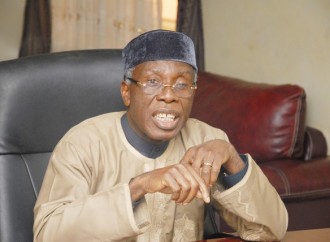
 The discovery of crude oil in Nigeria should have brought remarkable development to the country, but that has not been the case for the nation. Before the discovery of crude oil, agriculture was the main stay of the Nigerian economy, but it was relegated to the background with the emergence of liquid gold and is yet to be restored to its past glory.
The discovery of crude oil in Nigeria should have brought remarkable development to the country, but that has not been the case for the nation. Before the discovery of crude oil, agriculture was the main stay of the Nigerian economy, but it was relegated to the background with the emergence of liquid gold and is yet to be restored to its past glory.
Now, Nigeria is queuing behind other African countries like Ghana, Ivory Coast in the importation of cocoa, groundnuts, rubber and others. Although uncoordinated attempts were made over the years with the export of cassava, beans and vegetables, the massive importation of palm oil, rice, wheat, fruits, vegetable oil and frozen poultry products which could be produced locally, weighs down negatively on Nigeria’s food security.
The Nigerian economy is currently facing its worst recession because of its mono product economy. The foreign reserves have nosedived to $26.22 billion in July. Non-oil exports earned the country $1.1 billion in 2015, which is a 59% reduction on the 2014 figure of $2.71 billion, according to the Nigerian Export Promotion Council. As part of the President Mohammad Buhari’s campaign promises, the Green Alternative project has been launched as a roadmap to bring agriculture back to its rightful place in the economy.
Vice President, Prof. Yemi Osinbajo recently said the move to diversify the economy had become necessary due to the huge food importation bill and the need to create jobs for the teeming population of youths in the country. The roadmap is for the promotion of agriculture from 2016-2020. The Green Alternative will serve dual functions, which are reducing hunger in the nation, reduce reliance on importation of food and the diversification of the economy through the importation of agricultural produce stimulating agro-export for foreign earnings.
The project is not to be a fresh plan, but will consolidate on the successes of the previous administration in the sector. According to the Minister of Agriculture and Rural Development, Chief Audu Ogbeh, the government is not throwing old policies overboard but expanding, deepening and adjusting policies where necessary.
The Green Alternative Policy roadmap will help to collate information, harness intelligence & capacity and make knowledge available to farmers for practical implementation. The plan is that in another year and half, Nigeria will be self-sufficient in the production of grains like rice, beans and maize.
The Programme has 16 policy thrusts, including access to land, soil fertility, and access to inputs, storage and processing to measure performance. As at 2011, the country had 39.53% of its 762,000 square kilometres of land is arable, but apart from that, agriculture flourishes in countries where farmers have access to low interest rate.
According to the Vice President, the home-grown school feeding programme will have one meal a day for pupils and specifically the food will be from farms in each state. He also assured that the Bank of Agriculture would be recapitalized and repositioned to meet farmers’ financial need by giving them a single digit interest rate and low interest credit.
Unfortunately, deposit money banks in Nigeria charge up to 20% interest, to realize the project’s objective; the government has pledged to reform the Bank of Agriculture so that it can give single digit interest loans to farmers from September. The Ministry of Agriculture and Rural development needs to synergize with the private sector, states and local councils.
The capital base of the BoA stands at N50 billion, but partnership between the government-owned bank and the private sector can increase its lending capacity. Likewise, governments at other tiers should be accommodated in the plan in terms of access to land for farmers. The road networks that link the rural areas to the urban areas need to be expanded too. Also, farmers lose a lot of their produce to insufficient and obsolete storage facilities as the programme should seek to solve this issue for farmers through modern means of storage and processing that will reduce waste.
The government plans to improve crop yields with good seedlings and also improve access to mechanized farming. Good crop produce and the use of approved fertilizers is important towards exportation. Most developed nations ensure the quality of produce being brought into their countries meet approved standards.
But what makes this a more sustainable policy is that other social investments programmes are attached to it. The Home Grown School Feeding programme is expected to be sourced from the Green Alternative programme. Also, of the 500,000 teacher corps that will be engaged as extension workers for the farmers. Extension workers provide expert advice to the farmers every farming season, but only people that are interested in agriculture should be pooled into the extension workers programme.
The programme seeks to grow agriculture’s share of non-oil exports to 75%, while increasing its share of the Gross Domestic Product to 23% and labour force to 70%. The Green Alternative isn’t the first of its kind as there have been similar programmes in past administrations that failed. From the Operation Feed the Nation to Fadama I, Fadama II and Fadama III. Their failure was as a result of lack of continuity and political will, the Buhari administration has to ensure the Green Alternative doesn’t go the same way of past administrations. It cannot afford to let the programme fail.
